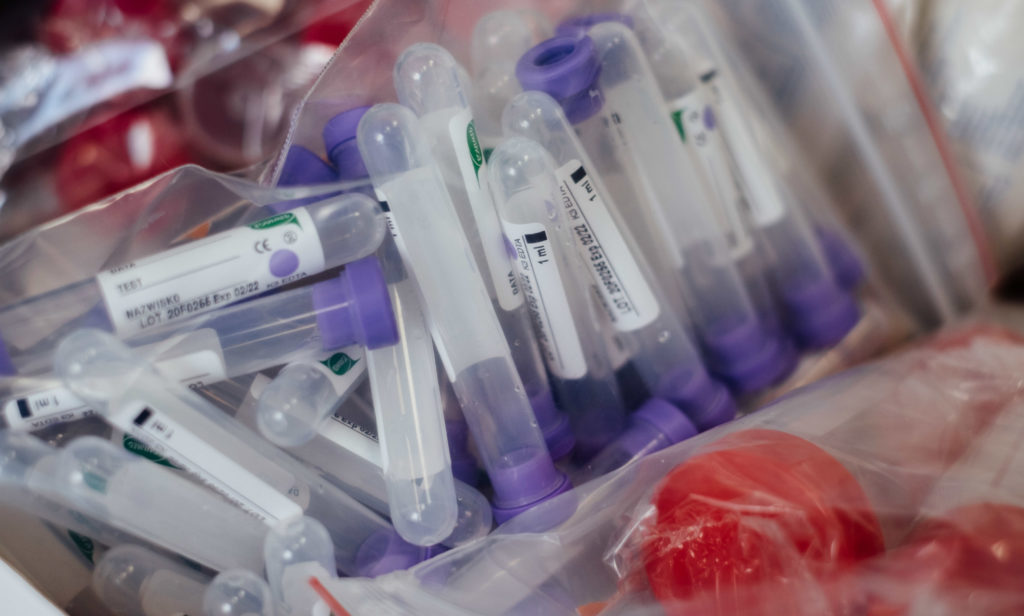Students are returning from winter break for yet another semester amidst the coronavirus pandemic. To ensure the safety of everyone returning to campus, UMKC is offering free COVID-19 tests through the Student Health and Wellness Center in the Brookside 51 building.
The university made the decision to keep the first two weeks of classes online after concerns grew of coronavirus cases surging following holiday travel and festivities. Since the semester began on Jan. 19, UMKC has reported 12 new cases among students and faculty.
In-person instruction for certain classes is set to resume in February, and with that, COVID-19 tests will be made available to staff, faculty and students.
“We are making them available February 1 to faculty, staff and students to keep our campus as safe as possible through the convenience and safety of a drive-up clinic,” said Stacy Downs, the assistant director of strategic communications for UMKC.
Currently, students are welcome to schedule an appointment at the Student Health and Wellness Center, even if they are not experiencing symptoms.
Obie Austin, the Student Health and Wellness Administrator, explained that the testing process should take about 20 minutes.
“The front interior portion of their nose is swabbed with a soft Q-Tip,” said Austin. “The test is then placed in a card with testing liquid applied. The card is then closed for 15 minutes while we await the rapid test results.”
As soon as the results are available, the student is notified verbally and via email. If someone tests positive, the university is notified, and the student must then start the proper quarantine procedures.
Appointments are made either online or by calling ahead. The tests will be offered for as long as supplies last, with the current supply of tests expiring in March. Austin said that they “have requested replenishment from the state and are awaiting approval.”
However, some students at UMKC will not be needing the tests.
A few students in the medical programs have been fortunate enough to receive some of the first doses of the COVID-19 vaccine.
“After the difficult year we have all had with this virus, I was relieved to have some peace of mind in not only increasing my safety, but the safety of those around me,” said Audrey Baumstark, a biology major in her second year.
The vaccines have been only made available to frontline healthcare workers as part of its phase one rollout. Currently, a mere 1.1% of the US population has received both doses of the vaccine. At UMKC, barely a fraction of that have gone through the process. Students like Gabriella Thorne, who works in the medical field, described receiving the vaccine as easy.
“I am a pharmacy technician that will be giving the COVID vaccine, so my employer asked me if I would be interested in receiving the vaccine,” said Thorne. “Once I said yes, he gave me a couple options for dates and locations. I walked in, filled out my paperwork and received the vaccine.”
When the vaccines rolled out, many worried about the side effects that would come along with the shot. However UMKC students who received the vaccine all said they only experienced soreness in their arm and a little fatigue, similar to the flu shot.
“I did not notice any side effects after receiving the vaccine, except for the given sore arm, however it was sorer than like the soreness from your flu vaccine,” said Ashley Hanners, a sophomore in pre-pharmacy. “After a day though, I could not feel that I had gotten it.”
Aside from the possible side effects, some Americans worry about the rushed nature of the vaccine rollout. Pew Research Center found that 62% of US citizens would be uncomfortable being one of the first groups to receive the vaccine.
Students like Thorne and Hanners were conscious of the rushed vaccine rollout, but still felt that taking the vaccine was a necessary step. Thorne said that the “pros outweigh any cons.” Hanners said that she believes in the science that created the vaccine and the doctors have put in a lot of hard work to ensure the safety of everyone.
While the university wants to vaccinate every student and staff member, a limited worldwide supply will cause delays.
“While we have the process, equipment, and people in place to vaccinate all of our campus, we are waiting for the vaccines, which are in high demand nationwide,” said Downs. “Since we don’t know when it will become available, we’re encouraging people to register through their county of residence and/or primary-care physician for the vaccine.”
cbskbf@mail.umkc.edu








